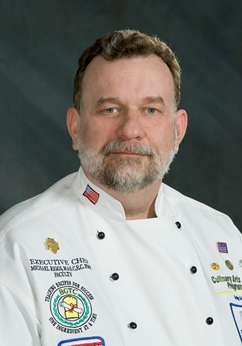Guest Speaker: My Culinary Awakening in Europe
31 October 2010By Michael Riggs, Ph.D., CEC, FMP
 Part 1 of a two-part story of an educator’s learning excursion this past summer.
Part 1 of a two-part story of an educator’s learning excursion this past summer.
Over the summer of 2010 I was given a unique opportunity to spend 14 days in England at Oxford University studying the history of European cuisine. First let me say that what took thousands of years to develop could not be researched in 14 days even with the 100 miles of books at the Oxford Bodleian Library. But what I did learn and experience came in the form of the best kind of research, eating and having conversations with chefs, restaurateurs and the people of the countries I visited. Let’s begin my journey …
London
Truly an “international cuisine city” with more than 100 cuisines being served in some of the finest restaurants in Europe. London has gone through a culinary explosion in the past decade, according to Geoff Booth, assistant principal (vice president) of the oldest culinary school in London, which was established by Chef Auguste Escoffier and Hotelier Cesar Ritz, two of Europe’s leading industry icons of the 1900s at Westminster Kings College of Hospitality.
We spent a few hours in his office, touring his school, having tea and scones (that was cool) and talking about how the culinary scene in London has changed due to the need to expand and react to a changing city, a changing culinary culture and the cultural diversity of this truly world-class city. Just wander the streets of the Piccadilly Circus area, and the options are endless: Italian, French, Indian, African, Moroccan, Japanese, German, Thai … It just keeps going, and all authentic cuisines not altered to the local taste profile. In case you were wondering, yes, KFC and a Big Mac are available. Sad but true.
I was on a mission and in search of one thing: English pub cuisine. English pub food is a concept of cultural significance that has spread worldwide. “Pub foods” and the truly local flair of these neighborhood eateries are much more unique than I had ever imagined. Having studied English cuisine and attempted to duplicate it, it was enlightening to try items such as bangers and mash and Scottish eggs (also known as Scotch eggs) in the authentic environment and to talk with the proprietors of some of these establishments.
There is such a focus on quality and a farm-to-table attitude to purchasing from suppliers. Example: Bangers are simply sausages, but it is common to find them being made in the butcher shops with a variety of meats and seasonings mixed together, then cooked and served over a bed of fresh mashed potatoes with a dark jus or fond underneath. These establishments and their cuisines are the venue of the working-class individuals, the English version of the neighborhood or small-town American diner. Comfort food: simple, easy, flavorful and fuel for the body and friendship for the soul. I kept waiting for Norm to walk in.
I enjoyed my first true English meat pie with a pint of ale in a pub called the Eagle and the Child, where J.R.R. Tolkien and C.S. Lewis met every Tuesday and discussed what they were working on as young writers. And we know what become of those literary ideas. Pub food, a must when in England!
Oxford
This college is the oldest English-speaking university in the world, founded in 1248. It was like living in history because the English preserve their history and buildings. I was able to work directly with head chef Steve Ramli-Davies and high steward David Woodfine of Harris Manchester College of Oxford. During my stay I spent two days working directly with these gentlemen in their dining facility and kitchens. Chef allowed me to work directly with him to prepare the closing meal for an academic think tank of American university professors. We served that meal in the same dining hall where the D-Day invasion was planned. History everywhere.
Chef Ramli-Davies took me on a tour of the Oxford market where he purchases his supplies fresh—the farm-to-table concept again—and allowed me to interview him about English and European cuisine while we worked. As we were walking to the market, coming toward us on this brick street was a young lady on a bicycle with a huge basket on the front. She stopped, and the basket was full of fresh cheeses Chef had ordered the day before. He took a look at them, and they exchanged a happy “Cheers.” Yes, they do say that at the end of EVERY conversation, and off she went to his kitchen to deliver them.
I also interviewed David Woodfine, who has an extensive career of more than 50 years in industry. He stated that English food had dramatically changed in the span of his career, going from food for fuel to food to enjoy and be savored. The change was due to the new global marketplace. The impact and availability of different foods has created a cultural change in the expectations and demands of the consumer. The average person is more educated on food, and his or her desire for diversity in cuisine has exploded. I told the high steward it sounded like what was taking place in the United States. There is a new attitude toward food on a global scale taking place.
[Read the rest of Chef Riggs’ story of his summer European journey in next month’s Gold Medal Classroom.]
Executive Chef Michael Riggs, Ph.D., CEC, FMP, is an associate professor in the culinary-arts program at Bowling Green (Ky.) Technical College and president of the South Central Kentucky Chapter of the Kentucky Restaurant Association.
Additional Info
- CAFÉ Talks Podcast Lesson Plan: 8
